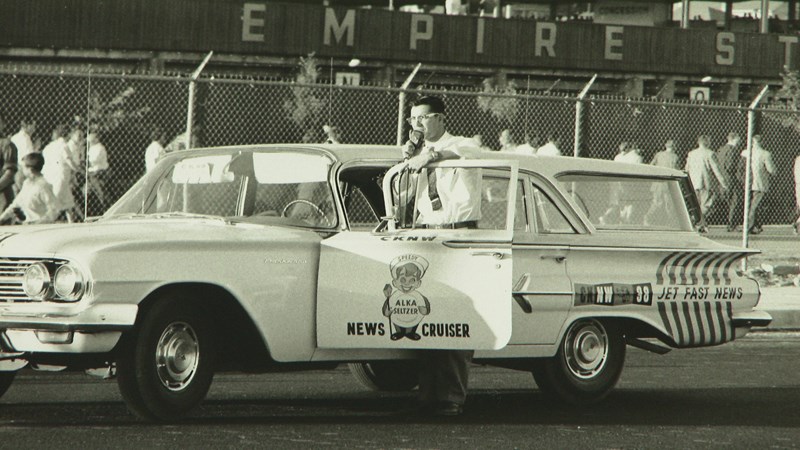“I’m against the government. Any government.” – radio journalist Jack Webster
Static sounded from the radio.
It was October 1962 and Typhoon Freda had walloped the West Coast. Seven British Columbians were killed. Vancouver was blanketed in darkness.
Across the dial radios played static … static … then a voice.
CKNW was on the air.
Just a week before Freda veered off Hawaii CKNW invested in a standby power system. While much of Vancouver’s media was silenced, CKNW’s on-air personalities – all of whom were broadcasting by candlelight – were literally the talk of the town.
In his new documentary Talk! Vancouver’s Fascination with Grand Journalism and Instant Democracy! broadcaster George Orr chronicles the personalities that propelled the post-war medium and the corporate decisions and political manoeuvring that defanged even radio’s top dog.
Radio had an unprecedented ability to “empower people,” Orr explains.
Before he was a journalist or a Green Party hopeful, Orr was a carpenter who always had the radio playing in the background. But with personalities like Jack Webster railing against police corruption and Pat Burns savaging “false gods and sacred cows,” the radio wouldn’t stay in the background for long.
The morning paper offered yesterday’s news. TV journalists were tethered to film cameras the approximate size of a protocol droid.
“Talk radio was live all the time with whatever was important,” Orr says. “You could hear it happen now.”
The documentary picks up in 1944 when Bill Rea was broadcasting in New Westminster. In the days after the war and before Howdy Doody, radio had a news break every four hours. Rea tried having news every hour. And then every 30 minutes.
The format demanded more depth, more nerve and more reporters.
Webster hopped from station to station while his salary jumped from $800 a week to $8,000 to a sum he judged unmentionable. CKNW and rival CJOR traded talent and scoops in a fight for the airwaves that culminated with CKNW picking up Burns’ contract and promptly shipping the beloved broadcaster to Montreal.
Through it all George Garrett was one of B.C.’s top reporters. After 43 years of tackling police corruption, prison riots, and all manner of scams, he was retiring.
“I love this city,” Garrett says in the documentary. “I feel so much a part of it.”
It was 1999, shortly before Corus would buy four stations and before staffing cuts spread across the industry.
He couldn’t say exactly why but Orr felt compelled to chronicle the end of Garrett’s career.
“I thought I was just collecting history,” he says.
It was a story without an end until Orr documented a CKNW debate.
“I watched Christy Clark, in 90 minutes, really demolishing the whole format,” Orr says.
While previous debates produced heat and light, Clark’s refusal to stray from talking points drained vitality from the medium, Orr explains.
The documentary includes footage of Clark’s speech at a 2007 Jack Webster Awards dinner in which she suggests the “worst thing” about politics is not being able to say what you think.
“... it’s close to humiliating to go cap in hand to the powers that be to ask them which words are allowed to come out of your mouth,” she says.
While Orr says he’s not pining for the “good old days,” he’s adamant the voices of yesterday be remembered.
“The world changed,” he says. “I just wanted to take a snapshot of a certain part of our culture and preserve it.”



